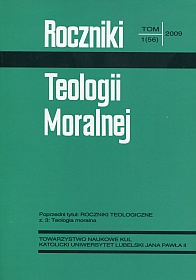Social Economy and the Church's Social Teaching Mutual Axiological Implications
Abstract
Social economy and the Church's social teaching are joined not only by a similar object of interest, i. e. a common axiological foundation in the form of certain values and principles. It seems that the existence of such connections on the axiological level is not very well known, which can be proven, among others, by the fact that it is hard to find any studies or even mentions connected with it in the literature on the subject. Hence an attempt seems justified to look closely and to analyze this connection in order to indicate the details of mutual implications, and so to show the possibilities of mutual enriching these two domains of human reflection on social life.
The article analyzes particular principles of social life that are preached by the Church as part of its social teaching, with respect to their presence or the necessity of considering them in social economy. First it points to (1) the source and foundation of all the social principles, which is the human person, and then it shows (2) the dignity of work and the call to be enterprising. Next, the following principles are analyzed: (3) the common good, the general allotment of goods and preferential option for the poor, and finally (4) solidarity, subsidiariness and participation.
References
Sobór Watykański II: Konstytucja duszpasterska o Kościele w świecie współczesnym Gaudium et spes (1965).
Leon XIII: Encyklika Rerum novarum (1891).
Pius XI: Encyklika Quadragesimo anno (1931).
Pius XII: Przemówienie radiowe (24 grudnia 1944).
Jan XXIII: Encyklika Mater et magistra (1961).
JanPaweł II: Encyklika Laborem exercens (1981).
− Encyklika Sollicitudo rei socialis (1987).
− Encyklika Centesiumus annus (1991).
Katechizm Kościoła Katolickiego. Poznań: Pallottinum 20022.
Papieska Rada Iustitia et Pax. Kompendium nauki społecznej Kościoła. Kielce: Jedność 2005.
Borutka T.: Zasady życia społecznego. W: Jan Paweł II. Encyklopedia nauczania społecznego. Red. A. Zwoliński. Radom: PWE 2005 s. 597-602.
Juros A.: Wstęp. W: Przychylić nieba i chleba. Przedsiębiorczość społeczna ludzi wsi. Red. A. Juros. Warszawa: WRZOS 2008 s. 6-11.
Majka J.: Filozofia społeczna. Wrocław: Wyd. Wrocławskiej Księgarni Archidiecezjalnej 1982.
Piwowarski W.: Katolicka nauka społeczna. W: Słownik katolickiej nauki społecznej. Red. W. Piwowarski. Warszawa: Instytut Wydawniczy PAX 1993 s. 76-77.
Polski model ekonomii społecznej. Rekomendacje dla rozwoju. Zaproszenie do dyskusji. Red. P. Frączak, J. J. Wygnański. Warszawa 2008.
Przeciw wykluczeniu społecznemu. Red. M. Duda, B. Gula. Kraków: Wyd. Naukowe PAT 2008.
Szczegółowy Opis Priorytetów Programu Operacyjnego Kapitał Ludzki 2007-2013. Warszawa: Ministerstwo Rozwoju Regionalnego 2008.
Zwoliński A.: Katolicka nauka społeczna. Kraków: Wyd. Naukowe PAT 1992.
www.bazy.ngo.pl
www.ekonomiaspoleczna.pl
http://www.ekonomiaspoleczna.pl/files/ekonomiaspoleczna.pl/public/manifest_ekonomii_spolecznej.pdf
http://www.ekonomiaspoleczna.pl/x/410380
www.wrzos.org.pl

